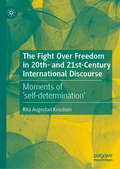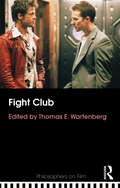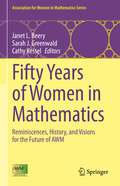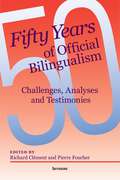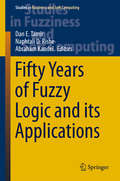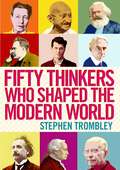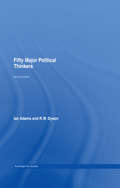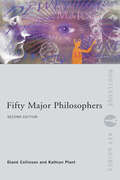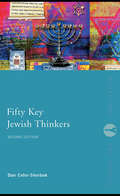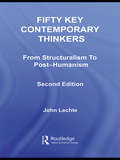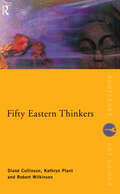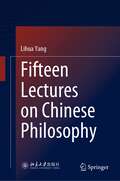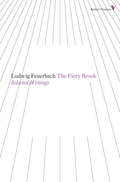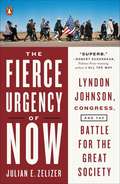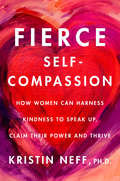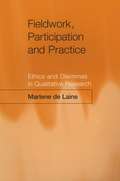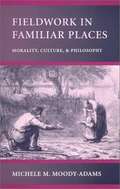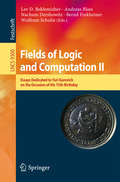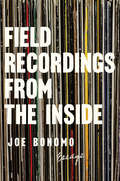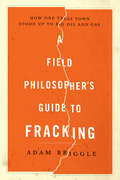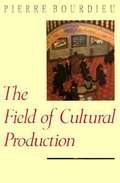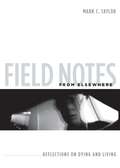- Table View
- List View
The Fight Over Freedom in 20th- and 21st-Century International Discourse: Moments of ‘self-determination’
by Rita Augestad KnudsenThis book shows how international discourse citing ‘self-determination’ over the last hundred years has functioned as a battleground between two ideas of freedom: a ‘radical’ idea of freedom, and a ‘liberal-conservative’ idea of freedom. The book examines each of the major moments in which ‘self-determination’ has been a central part of the language of high-level international politics and law: the early 20th century discourse of V.I. Lenin and U.S. President Woodrow Wilson, the aftermath of the First World War and the formulation of the UN Charter, the 1950-1960s UN debates on ‘self-determination’, and the 2008-2010 International Court of Justice case on Kosovo’s declaration of independence. At each of these moments in history, ‘self-determination’ was at the top of the international agenda. And at each moment, a fight over the meaning of freedom played out in ‘self-determination’ discourse. Besides providing insights into the historical times in which self-determination was prominently cited internationally, the book offers a recasting and renewal of international debates on freedom in international discourse.
Fight Club (Philosophers on Film)
by Thomas E. WartenbergReleased in 1999, Fight Club is David Fincher’s popular adaption of Chuck Palahniuk’s cult novel, and one of the most philosophically rich films of recent years. This is the first book to explore the varied philosophical aspects of the film. Beginning with an introduction by the editor that places the film and essays in context, each chapter explores a central theme of Fight Club from a philosophical perspective. Topics discussed include: Fight Club, Plato’s cave and Descartes’ cogito moral disintegration identity, gender and masculinity visuals and narration. Including annotated further reading at the end of each chapter, Fight Club is essential reading for anyone interested in the film, as well as those studying philosophy and film studies.
Fifty Years of Women in Mathematics: Reminiscences, History, and Visions for the Future of AWM (Association for Women in Mathematics Series #28)
by Cathy Kessel Janet L. Beery Sarah J. GreenwaldThe Assocation for Women in Mathematics (AWM), the oldest organization in the world for women in mathematics, had its fiftieth anniversary in 2021. This collection of refereed articles, illustrated by color photographs, reflects on women in mathematics and the organization as a whole. Some articles focus on the situation for women in mathematics at various times and places, including other countries. Others describe how individuals have shaped AWM, and, in turn, how the organization has impacted individuals as well as the broader mathematical community. Some are personal stories about careers in mathematics. Fifty Years of Women in Mathematics: Reminiscences, History, and Visions for the Future of AWM covers a span from AWM’s beginnings through the following fifty years. The volume celebrates AWM and its successes but does not shy away from its challenges.The book is designed for a general audience. It provides interesting and informative reading for people interested in mathematics, gender equity, or organizational structures; teachers of mathematics; students at the high school, college, and graduate levels; and members of more recently established organizations for women in mathematics and related fields or prospective founders of such organizations.
Fifty Years of Official Bilingualism: Challenges, Analyses and Testimonies
by Richard ClémentFifty years ago, the Royal Commission on Bilingualism and Biculturalism published its final report. The result of innovative research and public consultations across the country, this report, replete with data and concepts, sets the stage for a comprehensive policy on official bilingualism, which would profoundly and indelibly change the face of Canada. The resolve to affirm the officially bilingual character of the country was met with the equally fervent determination to make French the common language of Quebecers. This book provides a critical view of the content and the consequences of the report. It is the outcome of a series of conferences held across the country in 2013, which explored the impact of these two aspects. It combines analyses of the Commission's activities, its main players, and the specific content of certain volumes of the report. The book is divided into three parts: the first outlines the progress accomplished since the publication of the report and contributors' views of the challenges which continue to create controversy; the second part provides analyses and studies of topics covered by the Commission, effectively demonstrating how far things have evolved; and the third features testimonials, including a fascinating conversation between the first Commissioner for Official Languages, Keith Spicer, and the Commissioner in office at the time of publication, Graham Fraser.
Fifty Years of Fuzzy Logic and its Applications
by Dan E. Tamir Naphtali D. Rishe Abraham KandelThis book presents a comprehensive report on the evolution of Fuzzy Logic since its formulation in Lotfi Zadeh's seminal paper on "fuzzy sets," published in 1965. In addition, it features a stimulating sampling from the broad field of research and development inspired by Zadeh's paper. The chapters, written by pioneers and prominent scholars in the field, show how fuzzy sets have been successfully applied to artificial intelligence, control theory, inference, and reasoning. The book also reports on theoretical issues; features recent applications of Fuzzy Logic in the fields of neural networks, clustering, data mining and software testing; and highlights an important paradigm shift caused by Fuzzy Logic in the area of uncertainty management. Conceived by the editors as an academic celebration of the fifty years' anniversary of the 1965 paper, this work is a must-have for students and researchers willing to get an inspiring picture of the potentialities, limitations, achievements and accomplishments of Fuzzy Logic-based systems.
Fifty Thinkers Who Shaped the Modern World
by Stephen TrombleyThe development of modern thought is traced through a sequence of accessible profiles of the most influential thinkers in every domain of intellectual endeavor since 1789No major representative of post-Enlightenment thought escapes Trombley's attention in this history: the German idealists Kant, Fichte, Schelling, and Hegel; the utilitarians Bentham and Mill; the transcendentalists Emerson and Thoreau; Kierkegaard and the existentialists; founders of new fields of inquiry such as Weber, Durkheim, and C.S. Peirce; the analytic philosophers Russell, Moore, Whitehead, and Wittgenstein; political leaders from Mohandas K. Gandhi to Adolf Hitler; and—last but not least—the four shapers-in-chief of our modern world: the philosopher, historian, and political theorist Karl Marx; the naturalist Charles Darwin, proposer of the theory of evolution; Sigmund Freud, the father of psychoanalysis; and the theoretical physicist Albert Einstein, begetter of the special and general theories of relativity and founder of post-Newtonian physics. This book offers a crisp analysis of their key ideas, and in some cases a reevaluation of their importance as we proceed into the 21st century.
Fifty Major Political Thinkers (Routledge Key Guides)
by R. W. Dyson Ian AdamsFifty Major Political Thinkers introduces the lives and ideas of some of the most influential figures in Western political thought, from ancient Greece to the present day. The entries provide a fascinating introduction to the major figures and schools of thought that have shaped contemporary politics, including: Aristotle Simone de Beauvoir Michel Foucault Mohandas Gandhi Jurgen Habermas Machiavelli Karl Marx Thomas Paine Jean-Jacques Rousseau Mary Wollstonecraft. Fully cross-referenced and including a glossary of theoretical terms, this wide-ranging and accessible book is essential reading for anyone with an interest in the evolution and history of contemporary political thought.
Fifty Major Philosophers (Routledge Key Guides)
by Diané Collinson Kathryn PlantA comprehensive update of the best-selling first edition, this revitalized new text presents readers with a series of clear, well-written entries focusing on fifty of the most influential philosophers from the last two thousand years. Chosen to present the traditional mainstream of European philosophy, the text also provides a critical survey that meets the needs of readers seeking a broad basic understanding as well as a foundation for further philosophical enquiry. Encompassing a wide range of ancient, medieval and modern philosophers, features of the second edition include: new entries on Dewey, Collingwood, Popper, Quine, Merleau-Ponty, Ayer and Rawls a thorough revision of existing entries a complete update of the further reading section an expanded glossary the addition of an alphabetical table of contents and an index for ease of use. Authoritative and highly readable, this book is a vital reference tool for all those wishing to improve their understanding of some of the world’s most fascinating intellectual figures.
Fifty Key Jewish Thinkers (Routledge Key Guides)
by Dan Cohn-SherbokFifty Key Jewish Thinkers is a panoramic survey of over 2,000 years of Jewish thought, religious and secular, ancient and modern. Now in its second edition, this essential reference guide contains new introductions to the lives and works of such thinkers as: Hannah Arendt, Immanuel Levinas, Judith Plaskow, Sigmund Freud, and Walter Benjamin. Also including fully updated guides to further reading on figures from the middle ages through to the twenty-first century, historical maps and a chronology placing the thinkers in context, this is an essential and affordable one-volume reference to a rich and complex tradition.
Fifty Key Contemporary Thinkers: From Structuralism to Post-Humanism (Routledge Key Guides)
by John LechteThis revised second edition from our bestselling Key Guides includes brand new entries on some of the most influential thinkers of the twentieth- and twenty-first century: Zizek, Bergson, Husserl, Heidegger, Butler and Haraway. With a new introduction by the author, sections on phenomenology and the post-human, full cross-referencing and up-to-date guides to major primary and secondary texts, this is an essential resource to contemporary critical thought for undergraduates and the interested reader.
Fifty Eastern Thinkers (Routledge Key Guides)
by Diane Collinson Kathryn Plant Robert WilkinsonClose analysis of the work of fifty major thinkers in the field of Eastern philosophy make this an excellent introduction to a fascinating area of study. The authors have drawn together thinkers from all the major Eastern philosophical traditions from the earliest times to the present day. The philosophers covered range from founder figures such as Zoroaster and Confucius to modern thinkers such as Fung Youlan and the present Dalai Lama. Introductions to major traditions and a glossary of key philosophical terms make this a comprehensive and accessible reference resource.
Fifteen Lectures on Chinese Philosophy
by Lihua YangThis book introduces fifteen representative philosophers in ancient China, including Confucius, Laozi, Mencius, Zhuangzi, influential Neo-Taoist scholars, and prominent Neo-Confucian thinkers. It reveals the fundamental problems of each philosopher, clarifies the connotation of the concept as well as the specific reference of the problem, and presents the inherent context and structure of each philosopher’s thoughts. Further, the author analyzes a selection of these ancient philosophers’ main propositions and demonstrates the argumentation and proof processes behind the basic philosophical insights. As such, this book is a valuable academic resource for scholars and the interested readers wanting to gain an in-depth understanding of ancient Chinese philosophy today.
The Fiery Brook
by Ludwig Feuerbach Zawar HanfiFeuerbach's departure from the traditional philosophy of Hegel opened the door for generations of radical philosophical thought. His philosophy has long been acknowledged as the influence for much of Marx's early writings.Indeed, a great amount of the young Marx must remain unintelligible without reference to certain basic Feuerbachian texts. These selections, most of them previously untranslated, establish the thought of Feuerbach in an independent role. They explain his fundamental criticisms of the 'old philosophy' of Hegel, and advance his own humanistic thought, which finds its bases in life and sensuality. Feuerbach's contemporaneity as an existentialist, humanist, and atheist is clearly presented, and the reader can readily grasp the liberating influence of this too-long neglected philosopher.Professor Zawar Hanfi has written an excellent introduction establishing Feuerbach's environment, importance, and relevance and his translations surpass most previous Feuerbach translators.
The Fierce Urgency of Now
by Julian E. ZelizerA majestic big-picture account of the Great Society and the forces that shaped it, from Lyndon Johnson and members of Congress to the civil rights movement and the mediaBetween November 1963, when he became president, and November 1966, when his party was routed in the midterm elections, Lyndon Johnson spearheaded the most transformative agenda in American political history since the New Deal, one whose ambition and achievement have had no parallel since. In just three years, Johnson drove the passage of the Civil Rights and Voting Rights Acts; the War on Poverty program; Medicare and Medicaid; the National Endowments for the Arts and the Humanities; Public Broadcasting; immigration liberalization; a raft of consumer and environmental protection acts; and major federal investments in public transportation. Collectively, this group of achievements was labeled by Johnson and his team the "Great Society."In The Fierce Urgency of Now, Julian E. Zelizer takes the full measure of the entire story in all its epic sweep. Before Johnson, Kennedy tried and failed to achieve many of these advances. Our practiced understanding is that this was an unprecedented "liberal hour" in America, a moment, after Kennedy's death, when the seas parted and Johnson could simply stroll through to victory. As Zelizer shows, this view is off-base: In many respects America was even more conservative than it seems now, and Johnson's legislative program faced bitter resistance. The Fierce Urgency of Now animates the full spectrum of forces at play during these turbulent years, including religious groups, the media, conservative and liberal political action groups, unions, and civil rights activists.Above all, the great character in the book whose role rivals Johnson's is Congress--indeed, Zelizer argues that our understanding of the Great Society program is too Johnson-centric. He discusses why Congress was so receptive to passing these ideas in a remarkably short span of time and how the election of 1964 and burgeoning civil rights movement transformed conditions on Capitol Hill. Zelizer brings a deep, intimate knowledge of the institution to bear on his story: The book is a master class in American political grand strategy.Finally, Zelizer reckons with the legacy of the Great Society. Though our politics have changed, the heart of the Great Society legislation remains intact fifty years later. In fact, he argues, the Great Society shifted the American political center of gravity--and our social landscape--decisively to the left in many crucial respects. In a very real sense, we are living today in the country that Johnson and his Congress made.
The Fierce Urgency of Now
by Julian E. ZelizerA majestic big-picture account of the Great Society and the forces that shaped it, from Lyndon Johnson and members of Congress to the civil rights movement and the mediaBetween November 1963, when he became president, and November 1966, when his party was routed in the midterm elections, Lyndon Johnson spearheaded the most transformative agenda in American political history since the New Deal, one whose ambition and achievement have had no parallel since. In just three years, Johnson drove the passage of the Civil Rights and Voting Rights Acts; the War on Poverty program; Medicare and Medicaid; the National Endowments for the Arts and the Humanities; Public Broadcasting; immigration liberalization; a raft of consumer and environmental protection acts; and major federal investments in public transportation. Collectively, this group of achievements was labeled by Johnson and his team the "Great Society."In The Fierce Urgency of Now, Julian E. Zelizer takes the full measure of the entire story in all its epic sweep. Before Johnson, Kennedy tried and failed to achieve many of these advances. Our practiced understanding is that this was an unprecedented "liberal hour" in America, a moment, after Kennedy's death, when the seas parted and Johnson could simply stroll through to victory. As Zelizer shows, this view is off-base: In many respects America was even more conservative than it seems now, and Johnson's legislative program faced bitter resistance. The Fierce Urgency of Now animates the full spectrum of forces at play during these turbulent years, including religious groups, the media, conservative and liberal political action groups, unions, and civil rights activists.Above all, the great character in the book whose role rivals Johnson's is Congress--indeed, Zelizer argues that our understanding of the Great Society program is too Johnson-centric. He discusses why Congress was so receptive to passing these ideas in a remarkably short span of time and how the election of 1964 and burgeoning civil rights movement transformed conditions on Capitol Hill. Zelizer brings a deep, intimate knowledge of the institution to bear on his story: The book is a master class in American political grand strategy.Finally, Zelizer reckons with the legacy of the Great Society. Though our politics have changed, the heart of the Great Society legislation remains intact fifty years later. In fact, he argues, the Great Society shifted the American political center of gravity--and our social landscape--decisively to the left in many crucial respects. In a very real sense, we are living today in the country that Johnson and his Congress made.
Fierce Self-Compassion: How Women Can Harness Kindness to Speak Up, Claim Their Power, and Thrive
by Dr. Kristin NeffThe author of Self-Compassion follows up her groundbreaking book with new ideas that expand our notion of self-kindness and its capacity to transform our lives, showing women how to balance tender self-acceptance with fierce action to claim their power and change the world.Kristin Neff changed how we talk about self-care with her enormously popular first book, Self-Compassion. Now, ten years and many studies later, she expands her body of work to explore a brand-new take on self-compassion. Although kindness and self-acceptance allow us to be with ourselves as we are, in all our glorious imperfection, the desire to alleviate suffering at the heart of this mindset isn't always gentle, sometimes it's fierce. We must also act courageously in order to protect ourselves from harm and injustice, say no to others so we can meet our own needs, and motivate necessary change in ourselves and society. Gender roles demand that women be soft and nurturing, not angry or powerful. But like yin and yang, the energies of fierce and tender self-compassion must be balanced for wholeness and wellbeing. Drawing on a wealth of research, her personal life story and empirically supported practices, Neff demonstrates how women can use fierce and tender self-compassion to succeed in the workplace, engage in caregiving without burning out, be authentic in relationships, and end the silence around sexual harassment and abuse. Most women intuitively recognize fierceness as part of their true nature, but have been discouraged from developing it. Women must reclaim their power in order to create a healthier society and find lasting happiness. In this wise, caring, and enlightening book, Neff shows women how to reclaim balance within themselves, so they can help restore balance in the world.
Fieldwork, Participation and Practice: Ethics and Dilemmas in Qualitative Research
by Marlene De Laine'I would highly recommend Fieldwork, Participation and Practice: Ethics and Dilemmas in Qualitative Research as a text for the wide range of fields that currently engage in fieldwork. She does an excellent job of moving beyond basic ethical principles and informs the reader of the complexity of contemporary fieldwork' - Forum for Qualitative Social Research - follow the link below to read the complete review This timely and topical look at the role of ethics in fieldwork takes into account some of the major issues confronting qualitative researchers. The main purposes of this book are twofold: to promote an understanding of the harmful possibilities of fieldwork; and to provide ways of dealing with ethical problems and dilemmas. To these ends, examples of actual fieldwork are provided that address ethical problems and dilemmas, and posit ways of dealing with them.
Fieldwork In Familiar Places: Morality, Culture, And Philosophy
by Michele M. Moody-AdamsThe persistence of deep moral disagreements--across cultures as well as within them--has created widespread skepticism about the objectivity of morality. Moral relativism, moral pessimism, and the denigration of ethics in comparison with science are the results. Fieldwork in Familiar Places challenges the misconceptions about morality, culture, and objectivity that support these skepticisms, to show that we can take moral disagreement seriously and yet retain our aspirations for moral objectivity. Michele Moody-Adams critically scrutinizes the anthropological evidence commonly used to support moral relativism. Drawing on extensive knowledge of the relevant anthropological literature, she dismantles the mystical conceptions of "culture" that underwrite relativism. She demonstrates that cultures are not hermetically sealed from each other, but are rather the product of eclectic mixtures and borrowings rich with contradictions and possibilities for change. The internal complexity of cultures is not only crucial for cultural survival, but will always thwart relativist efforts to confine moral judgments to a single culture. Fieldwork in Familiar Places will forever change the way we think about relativism: anthropologists, psychologists, historians, and philosophers alike will be forced to reconsider many of their theoretical presuppositions. Moody-Adams also challenges the notion that ethics is methodologically deficient because it does not meet standards set by natural science. She contends that ethics is an interpretive enterprise, not a failed naturalistic one: genuine ethical inquiry, including philosophical ethics, is a species of interpretive ethnography. We have reason for moral optimism, Moody-Adams argues. Even the most serious moral disagreements take place against a background of moral agreement, and thus genuine ethical inquiry will be fieldwork in familiar places. Philosophers can contribute to this enterprise, she believes, if they return to a Socratic conception of themselves as members of a rich and complex community of moral inquirers.
Fields of Logic and Computation II
by Wolfram Schulte Bernd Finkbeiner Nachum Dershowitz Andreas Blass Lev D. BeklemishevThis Festschrift is published in honor of Yuri Gurevich's 75th birthday. Yuri Gurevich has made fundamental contributions on the broad spectrum of logic and computer science, including decision procedures, the monadic theory of order, abstract state machines, formal methods, foundations of computer science, security, and much more. Many of these areas are reflected in the 20 articles in this Festschrift and in the presentations at the "Yurifest" symposium, which was held in Berlin, Germany, on September 11 and 12, 2015. The Yurifest symposium was co-located with the 24th EACSL Annual Conference on Computer Science Logic (CSL 2015).
Field Research in Political Science
by Diana Kapiszewski Lauren M. MacLean Benjamin L. Read Diana Kapiszewski Lauren M. MacleanField research - leaving one's home institution in order to acquire data, information or insights that significantly inform one's research - remains indispensable, even in a digitally networked era. This book, the first of its kind in political science, reconsiders the design and execution of field research and explores its role in producing knowledge. First, it offers an empirical overview of fieldwork in the discipline based on a large-scale survey and extensive interviews. Good fieldwork takes diverse forms yet follows a set of common practices and principles. Second, the book demonstrates the analytic benefits of fieldwork, showing how it contributes to our understanding of politics. Finally, it provides intellectual and practical guidance, with chapters on preparing for field research, operating in the field and making analytic progress while collecting data, and on data collection techniques including archival research, interviewing, ethnography and participant observation, surveys, and field experiments.
Field Recordings from the Inside: Essays
by Joe BonomoUsing as its epigraph and unifying principle Luc Sante’s notion that "Every human being is an archeological site,” Field Recordings from the Inside provides a deep and personal examination at the impact of music on our lives. Bonomo effortlessly moves between the personal and the critical, investigating the ways in which music defines our personalities, tells histories, and offers mysterious, often unbidden access into the human condition. The book explores the vagaries and richness of music and music-making-from rock and roll, punk, and R&B to Frank Sinatra, Nashville country, and Delta blues-as well as the work of a diverse group of artists and figures-Charles Lamb, music writer Lester Bangs, painter and television personality Bob Ross, child country musician Troy Hess, and songwriter Greg Cartwright.Mining the often complex natures and shapes of the creative process, Field Recordings from the Inside is a singular work that blends music appreciation, criticism, and pop culture from one of the most critically acclaimed music writers of our time.
Field Philosopher's Guide to Fracking: How One Texas Town Stood Up to Big Oil and Gas
by Adam BriggleWhen philosophy professor Adam Briggle moved to Denton, Texas, he had never heard of fracking.<P><P> Only five years later he would successfully lead a citizens' initiative to ban hydraulic fracturing in Denton--the first Texas town to challenge the oil and gas industry. On his journey to learn about fracking and its effects, he leaped from the ivory tower into the fray. In beautifully narrated chapters, Briggle brings us to town hall debates and neighborhood meetings where citizens wrestle with issues few fully understand. Is fracking safe? How does it affect the local economy? Why are bakeries prohibited in neighborhoods while gas wells are permitted next to playgrounds? In his quest for answers Briggle meets people like Cathy McMullen. Her neighbors' cows asphyxiated after drinking fracking fluids, and her orchard was razed to make way for a pipeline. Cathy did not consent to drilling, but those who profited lived far out of harm's way. Briggle's first instinct was to think about fracking--deeply. Drawing on philosophers from Socrates to Kant, but also on conversations with engineers, legislators, and industry representatives, he develops a simple theory to evaluate fracking: we should give those at risk to harm a stake in the decisions we make, and we should monitor for and correct any problems that arise. Finding this regulatory process short-circuited, with government and industry alike turning a blind eye to symptoms like earthquakes and nosebleeds, Briggle decides to take action. Though our field philosopher is initially out of his element--joining fierce activists like "Texas Sharon," once called the "worst enemy" of the oil and gas industry--his story culminates in an underdog victory for Denton, now nationally recognized as a beacon for citizens' rights at the epicenter of the fracking revolution.
The Field of Cultural Production
by Pierre Bourdieu Randal Johnson Lawrence D. Kritzman Richard Wolin<p>During the last two decades, sociologist Pierre Bourdieu has become a dominant force in cultural activity ranging from taste in music and art to choices in food and lifestyles. <p>The Field of Cultural Production brings together Bourdieu's major essays on art and literature and provides the first introduction to Bourdieu's writings and theory of a cultural field that situates artistic works within the social conditions of their production, circulation, and consumption. <p>Bourdieu develops a highly original approach to the study of literary and artistic works, addressing many of the key issues that have preoccupied literary art and cultural criticism in the last twentieth century: aesthetic value and canonicity, intertextuality, the institutional frameworks of cultural practice, the social role of intellectuals and artists, and structures of literary and artistic authority. <p>Bourdieu elaborates a theory of the cultural field which situates artistic works within the social conditions of their production, circulation, and consumption. He examines the individuals and institutions involved in making cultural products what they are: not only the writers and artists, but also the publishers, critics, dealers, galleries, and academies. He analyzes the structure of the cultural field itself as well as its position within the broader social structures of power. <p>The essays in his volume examine such diverse topics as Flaubert's point of view, Manet's aesthetic revolution, the historical creation of the pure gaze, and the relationship between art and power. <p>The Field of Cultural Production will be of interest to students and scholars from a wide range of disciplines: sociology and social theory, literature, art, and cultural studies.</p>
Field Notes from Elsewhere: Reflections on Dying and Living
by Mark C. TaylorIn the fall of 2005, Mark C. Taylor, the controversial public intellectual and widely respected scholar, suddenly fell critically ill. For two days a team of forty doctors, many of whom thought he would not live, fought to save him. Taylor would eventually recover, but only to face a new threat: surgery for cancer. "These experiences have changed me in ways I am still struggling to understand," Taylor writes in this absorbing memoir. "After the past year, I am persuaded that I have done enough fieldwork to write a book that combines philosophical and theological reflection with autobiographical narrative. Writing is not only possible but actually seems necessary."Field Notes from Elsewhere is Taylor's unforgettable, inverted journey from death to life. Each of his memoir's fifty-two chapters and accompanying photographs recounts a morning-to-evening experience with sickness and convalescence, mingling humor and hope with a deep exploration of human frailty and, conversely, resilience. When we confront the end of life, Taylor explains, the axis of the lived world shifts, and everything must be reevaluated. As Taylor sorts through his remembrances, much that once seemed familiar becomes strange, paradoxical, and contradictory. He reads his experience with and against ghosts from his past, recasting the meaning of mortality, sacrifice, solitude, and abandonment, along with a host of other issues, in light of modern ways of dying. "You never come back from elsewhere," Taylor concludes, "because elsewhere always comes back with you."
Field Notes from Elsewhere: Reflections on Dying and Living
by Mark C. TaylorIn the fall of 2005, Mark C. Taylor, the controversial public intellectual and widely respected scholar, suddenly fell critically ill. For two days a team of forty doctors, many of whom thought he would not live, fought to save him. Taylor would eventually recover, but only to face a new threat: surgery for cancer. "These experiences have changed me in ways I am still struggling to understand," Taylor writes in this absorbing memoir. "After the past year, I am persuaded that I have done enough fieldwork to write a book that combines philosophical and theological reflection with autobiographical narrative. Writing is not only possible but actually seems necessary." Field Notes from Elsewhere is Taylor's unforgettable, inverted journey from death to life. Each of his memoir's fifty-two chapters and accompanying photographs recounts a morning-to-evening experience with sickness and convalescence, mingling humor and hope with a deep exploration of human frailty and, conversely, resilience. When we confront the end of life, Taylor explains, the axis of the lived world shifts, and everything must be reevaluated. As Taylor sorts through his remembrances, much that once seemed familiar becomes strange, paradoxical, and contradictory. He reads his experience with and against ghosts from his past, recasting the meaning of mortality, sacrifice, solitude, and abandonment, along with a host of other issues, in light of modern ways of dying. "You never come back from elsewhere," Taylor concludes, "because elsewhere always comes back with you."
